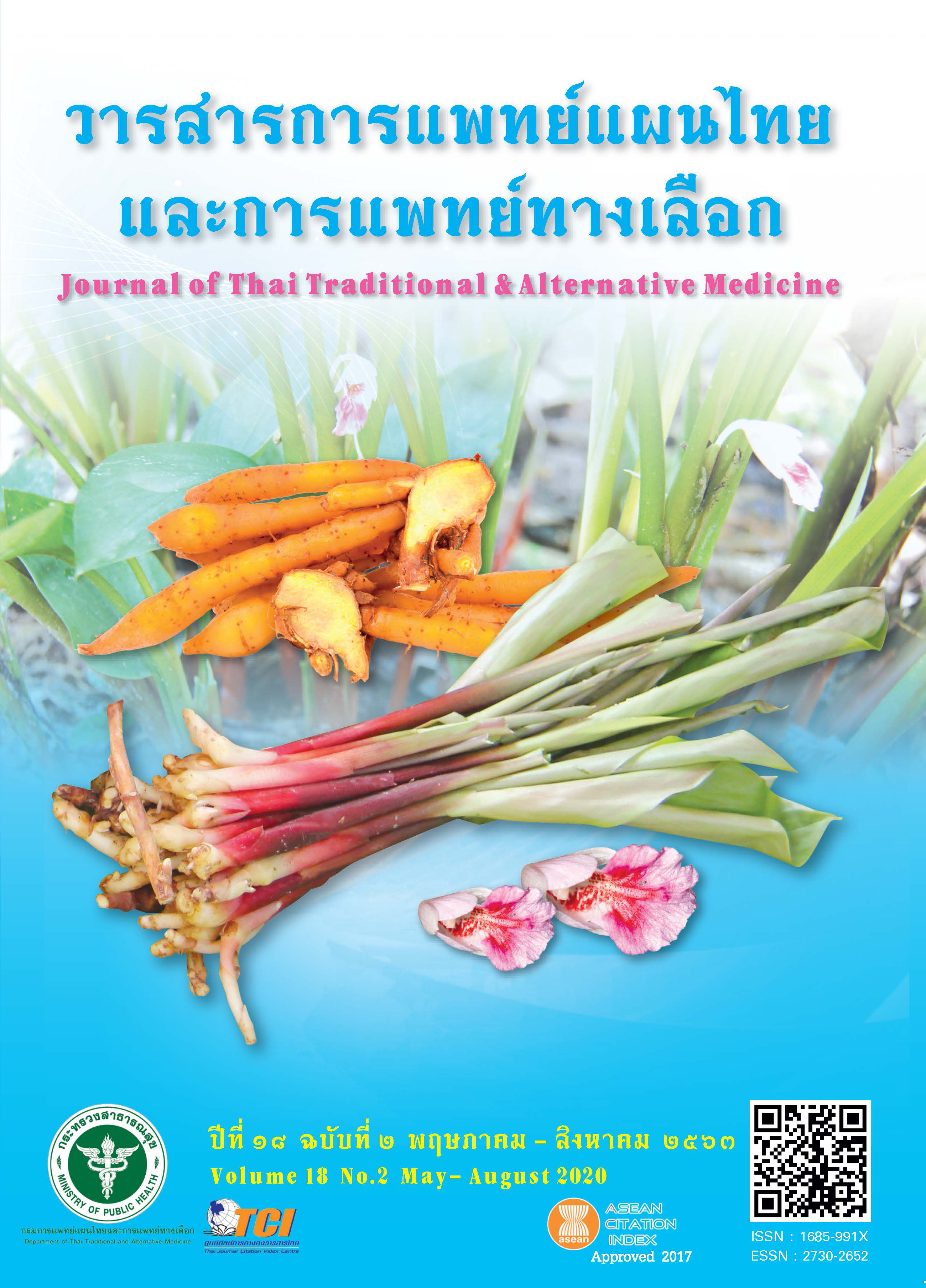Preliminary Effects and Safety of French Maritime Pine Bark Extracts on Lowering Fasting Plasma Glucose Levels in Patients with Prediabetes
Main Article Content
Abstract
Currently, incidence of new diabetic patients in Thailand increased. Diabetes is a non-communicable disease that cause of premature death. For this reason, The Ministry of Public Health realize of prevention and focusing on screening in the risk groups and recommendation in changing lifestyle. Unfortunately, the attempts are not success. With this reason French maritime pine bark extract may be an alternative in slow down the occurrence of diabetes in the future. The substance from French maritime pine bark extract. which is extracted from the fresh bark of the French maritime pine trees. The French maritime pine bark extract is a Phytochemical Flavonoids groups. The main mechanism of French maritime pine bark extract is grasping the enzyme of alpha glucosidase. This results in the decreasing conversion from carbohydrates to glucose and subsequently lowering blood sugar level. The objectives were study on effectiveness of French maritime pine bark extract on lowering fasting plasma glucose, waist circumference, bodyweight, BMI and HbA1C in prediabetes patients. The study was double-blind randomized placebo-controlled experimental trial. The thirty-two volunteers between aged 35 to 60 years old were randomized into two groups. The test group of sixteen volunteers received 50 mg of French maritime pine bark extract orally 2 capsules per day for a period of 12 weeks compared with control group received placebo. The parameters such as fasting plasma glucose, waist circumference, bodyweight, BMI and HbA1C were measured before and after the experiment. After 12 weeks; fasting plasma glucose, waist circumference, bodyweight and BMI in the test group were decreased with statistical significance at 95% confidence level while HbA1C in the test group was tended to decrease more than the control group but not statistically significant. In addition, side effects were not found.
Article Details
References
Saeedi P, Petersohn I, Salpea P, Malanda B, Karuranga S, Unwin N,Colagiuri S, Guariguata L, Motala A.A, Ogurtsova K, Shaw J.E, Bright D, Williams R, On behalf of the IDF Diabetes Atlas Committee. Global and regional diabetes prevalence estimates for 2019 and projections for 2030 and 2045: Results from the International Diabetes Federation Diabetes Atlas, 9th edition. Diabetes Res Clin Pract. 2019;157:107843.
Tonghong A. Epidemiological Surveillance. Nonthaburi: Bureau of Epidemiology, Department of Disease Control, Ministry of Public health; 2015. (in Thai)
Thujinda S, Wongsawat W, Wansang S, Perapatdit T, Nitiyanan W, Suthijamrun A, et al. Guildelines for screening for diabetes diagnosis in adults. Clinical Practice Guideline for Diabetes 2. Pathum Thani: Romyen Media; 2017. p. 26-30. (in Thai)
Hosseini S, Pishnamazi S, Sadrzadeh SM, Farid F, Farid R, Watson RR. Pycnogenol® in the management of asthma. J Med Food. 2001;4(4):201-9.
Zibadi S, Rohdewald P, Park D, Watson RR. Reduction of cardiovascular risk factors in subjects with type 2 diabetes by Pycnogenol® supplementation. Nutr Res. 2008;28(5):315-20.
Liu X, Zhou H-J, Rohdewald P. French maritime pine bark extract Pycnogenol® dose-dependently lowers glucose in type II diabetic patients. Diabetes Care. 2004;27(3):839.
Liu X, Wei J, Tan F, Zhou S, Würthwein G, Rohdewald P. Antidiabetic effect of Pycnogenol® French maritime pine bark extract in patients with diabetes type II. Life Sci. 2004;75(21):2505-13.
Rohdewald P. A review of the French maritime pine bark extract (Pycnogenol®), a herbal medication with a diverse clinical pharmacology. Int J Clin Pharmacol Ther. 2002;40(4):158-68.
Internal Clinical Safety Report Geneva, Switzerland: Horphag Research Management; October 26 2006.
Kohama T, Suzuki N, Ohno S, Inoue M. Analgesic efficacy of French maritime pine bark extract in dysmenorrhea: an open clinical trial. J Reprod Med. 2004;49(10):828-32.
Schäfer A, Högger P. Oligomeric procyanidins of French maritime pine bark extract (Pycnogenol®) effectively inhibit alpha-glucosidase. Diabetes Res Clin Pract. 2007;77(1):41-6.
Lee HH, Kim KJ, Lee OH, Lee BY. Effect of Pycnogenol® on glucose transport in mature 3T3-L1 adipocytes. Phytother Res. 2010;24(8):1242-9.
Packer L, Rimbach G, Virgili F. Antioxidant activity and biologic properties of a procyanidin-rich extract from pine (Pinas maritima) bark Pycnogenol®. Free Radic Biol Med. 1999;27(5-6):704-24.
Maneerat R, Koonngam P. A study on the effectiveness of pineapple facial masks recipes for facial skin whiteness. Nursing, Health, and Education Journal. 2019;2(4):22-8. (in Thai)
Belcaro G, Cornelli U, Luzzi R, Cesarone MR, Dugall M, Feragalli B, Errichi S, Ippolito E, Grossi MG, Hosoi M, Cornelli M, Gizzi G. Pycnogenol® supplementation improves health risk factors in subjects with metabolic syndrome. Phytother Res. 2013;27(10):1572-8.
Hasegawa N. Stimulation of lipolysis by Pycnogenol®. Phytother Res. 1999;13(7):619-20.
Mochizuki M, Hasegawa N. Pycnogenol® stimulates lipolysis in 3t3-L1 cells via stimulation of beta-receptor mediated activity. Phytother Res. 2004;18(12):1029-30.
Hasegawa N. Inhibition of lipogenesis by Pycnogenol®. Phytother Res. 2000;14(6):472-3.
Cong H, Zhong W, Wang Y, Ikuyama S, Fan B, Gu J. Pycnogenol® induces browning of white adipose tissue through the PKA signaling pathway in apolipoprotein E-deficient mice. J Diabetes Res. 2018;2018:9713259


